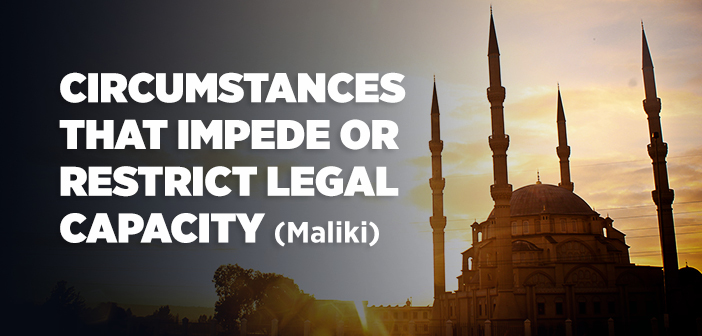What is circumstances that impede or restrict legal capacity in fiqh?
In order to be a mukallaf, one has to have ahliyyah, meaning the ability or legal capacity to acquire rights and exercise them and to accept duties and perform them.
Ahliyya is divided into two parts: ahliyyah al-wujub, ahliyyah al-ada’.
Ahliyyah al-wujub is the eligibility of a person to acquire rights for and upon him. A person is entitled to this legal capacity from the time he is born. Whatever his mental or physical capacity may be, he is absolutely entitled to it like every other person. Ahliyyah al-ada’ is the eligibility of a person to execute or discharge his right and duties in a manner recognized by law. Sanity and discernment (tamyeez) are both essential for this type of ahliyyah. Discernment (tamyeez) refers to being able to distinguish good from bad, beneficial from harmful.
In some cases, the ahliyyah is either fully impeded or restricted. The circumstances that impede or restrict the ahliyyah are the following:
1- ‘Awaridh Samawiyya (Involuntary Impediments): These are impediments due to factors beyond one’s control. The factor exists without the affected person’s choice; e.g. insanity, imbecility, unconsciousness, sleeping, death or illness.
2-‘Awaridh Muktasabah (Voluntary Impediments): These are impediments due to factors within one’s control. They exist due to the person’s own act and his choice. Examples are; drunkenness, prodigality, being enslaved, ignorance, hunger and thirst etc.
Source: Fiqh1 (According To The Maliki School Of Islamic Law), Erkam Publications





